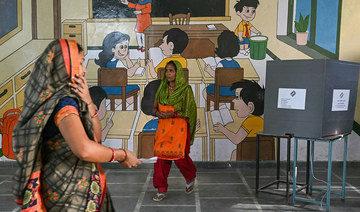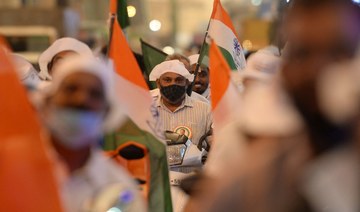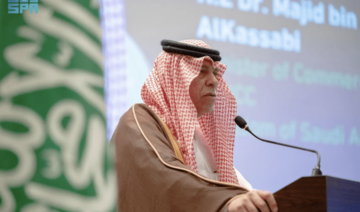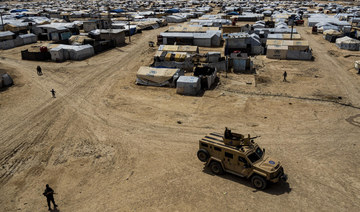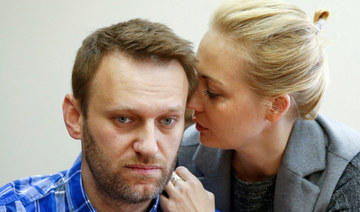NEW DELHI: India’s mammoth general election rolled on Friday into its second phase, which is widely believed to likely set the trend for the rest of the polls.
More than 968 million voters were registered to cast the ballot vote in the world’s most populous country, where incumbent Prime Minister Narendra Modi and his Hindu nationalist Bharatiya Janata Party are eyeing a rare third straight five-year term in power.
The first phase of the vote was on April 19 as polling takes place over six weeks, with results expected on June 4. The other voting dates will be May 7, May 13, May 20, May 25 and June 1.
India has a total of 28 states and eight federally governed territories. Some regions complete the process on a single day, and others spread it out over several phases.
Voting last week took place in 21 states and union territories, with nearly 169 million people eligible to cast their ballots. In the second phase, more than 160 million people were expected to vote across 13 states and federal territories.
As many as 1,202 candidates contested the polls on Friday, vying for 88 of the 543 seats in the lower house of Parliament. In the previous phase, 102 seats were up for grabs.
More than half of the 88 seats were in the southern states of Kerala and Karnataka and the northwestern state of Rajasthan.
The party or coalition that wins at least 272 seats will form the government.
Modi, who ahead of the election was targeting 400 seats for his BJP-led National Democratic Alliance, is challenged by an alliance of two dozen opposition parties — the Indian National Developmental Inclusive Alliance, or INDIA, led by the Congress party, which has ruled the country for close to 45 years since independence in 1947.
‘MINI-GENERAL ELECTION’
The second phase of India’s polls is seen by analysts as defining the dynamics of the remaining five phases. One of the factors was the voter turnout, which in this election might be lower.
In the first phase, 66 percent of those eligible to vote cast their ballot — compared with 70 percent in 2019.
“From the first phase of the election, the message went that there is a silent undercurrent against the BJP and the dip in the voting percentage sent the signal that the BJP would slip in its strongholds in northern India particularly Uttar Pradesh,” Umakant Lakhera, political commentator in Delhi, told Arab News.
“If the trend of voters’ perceived apathy toward the election in general — and the BJP in particular — continues, then it’s an opportunity for the opposition Congress party to consolidate and mobilize its resources to widen its reach and capitalize on anti BJP sentiment.”
The key leader of the opposition coalition and Congress member is Rahul Gandhi, the son of Rajiv Gandhi, a grandson of Indira Gandhi, and a great-grandson of Jawaharlal Nehru, all of whom served as prime ministers of India.
Gandhi is seeking re-election from Wayanad in Kerala — the only major state that has never elected a BJP member of parliament, and where it was not a main competitor. This year, Modi’s party has been trying to make inroads into the state’s political scene.
The main contenders, besides Gandhi, are Annie Raja of the Communist Party of India and BJP’s K. Surendran.
“Kerala always has witnessed bipolar politics, but the BJP has been trying this time to make it a triangular contest, and this election will test whether a third force can find space in Kerala or not,” Prof. G. Gopa Kumar, political scientist and adviser to the Kerala-based Center for Public Policy Research, told Arab News.
“The second phase will test whether the stigma of the BJP of being an outsider in Kerala will continue or not, whether the stigma of not winning a seat in Kerala will continue or not.”
Far from Kerala, in the north, where several states were also going to the polls, another test was taking place at the same time — for the Congress party. Congress plunged to a historic low when it was swept out of power by the BJP in the 2014 general vote, and won its second-lowest number of 52 seats in 2019.
“The second phase is a mini-general election. What is at stake is whether the Congress is going to challenge the dominance of the BJP in the north Indian states like Uttar Pradesh, Rajasthan, Madhya Pradesh or not,” Kumar said.
“The contest is getting serious from now on. For the Congress, it is a survival question as they have to prove that they can defeat the BJP and survive as a big force.”
Although surveys suggest Modi will easily win a comfortable majority in parliament, his 400-seat target, often repeated ahead of the polls, has not been cited since last week’s first phase.
Asad Rizvi, an analyst based in Lucknow, the capital of India’s most populous state and BJP stronghold, Uttar Pradesh, said that the performance was apparently not as good as expected, despite the repetition of the party’s tactics of polarization along religious lines.
“A perception has come to dominate after the first phase of elections that the BJP has not performed well in its strongholds in Uttar Pradesh, therefore, the BJP will have a tough time mobilizing its core voters to retain the seats,” he told Arab News.
“The second phase is also crucial that will test whether the BJP’s communal agenda is working or not.”
India’s mammoth election heats up in trend-defining second phase
https://arab.news/2mp4r
India’s mammoth election heats up in trend-defining second phase
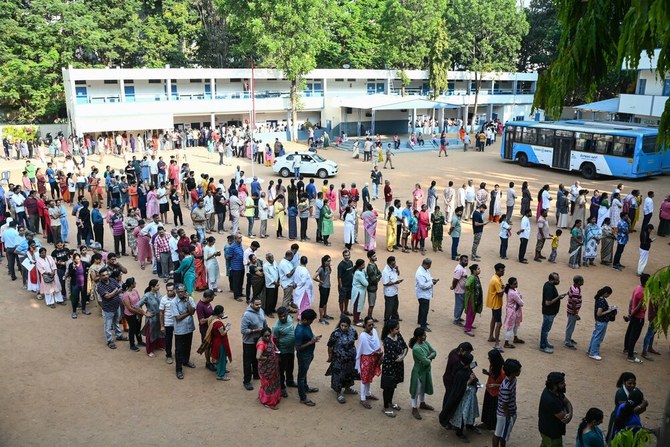
- Second phase is seen by analysts as defining dynamics of rest of the polls
- Turnout in first phase was lower than expected — 66 percent, compared with 70 percent in 2019
Key debt ratio resumes rise as global debt burden hits record $315 trillion, IIF says
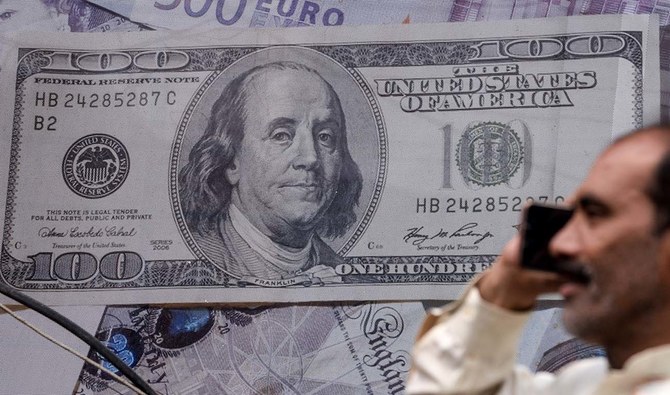
- The turnaround comes as dollar value of global debt surged by some $1.3 trillion quarter-on-quarter
- Pakistan is set to spend above 50 percent of its revenue on interest and Egypt more than 60 percent
NEW YORK: A key measure of world indebtedness has resumed its climb as global debt hit a record high of $315 trillion in the first quarter of the year, fueled by borrowing in emerging markets, the United States and Japan, a study showed.
The global debt-to-output ratio — a measure describing the ability of a borrower to pay back debt — rose to hit 333 percent after three consecutive quarters of decline, the Institute of International Finance (IIF) said on Tuesday in its quarterly Global Debt Monitor report.
The turnaround comes as the dollar value of global debt surged by some $1.3 trillion quarter-on-quarter.
Debt in emerging markets grew to a record of more than $105 trillion — having more than doubled over the past decade according to IIF data.
The largest contributors to the increase among emerging economies were China, India and Mexico. South Korea, Thailand, and Brazil posted the largest dollar value declines in overall debt among the subgroup, the data showed.
“Government budget deficits are still higher than pre- pandemic levels and are projected to contribute around $5.3 trillion to global debt accumulation this year,” the IIF said in a statement. “Rising trade friction and geopolitical tensions also present significant potential headwinds for debt markets.”
Interest rates were expected to have started declining in the United States by now but sticky inflation has seen the Federal Reserve stand its ground.
This has meant higher borrowing costs across the globe and, for many emerging markets, weakened currencies that further exacerbate the cost of servicing debt and “could once again bring government debt strains to the fore,” the IIF said.
Egypt and Pakistan are seen as the emerging economies where the interest expense on government debt will be highest through 2026, with Pakistan set to spend above 50 percent of revenue on interest and Egypt more than 60 percent.
Among developed economies, the United States and Japan saw debt rise the quickest, adding 17 percentage points and 4 percentage points respectively.
Japan is expected to continue to spend on average under 2 percent of government revenue in debt servicing through 2026, according to the IIF. In the US, the figure is expected to rise above 10 percent from the current 8 percent and brush against 12 percent in the same period.
Last month, the International Monetary Fund warned the US level of spending is “of particular concern” and “out of line with long-term fiscal sustainability.”
UK prime minister summons university leaders over pro-Palestinian protests
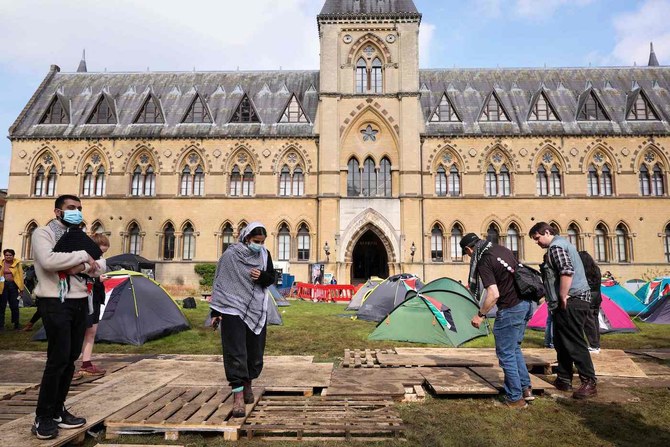
- Meeting to discuss antisemitism, ensuring Jewish students are safe
LONDON: UK Prime Minister Rishi Sunak is to summon the leaders of universities following pro-Palestinian protests that have taken place at campuses across the country.
The meeting will take place this week to discuss antisemitism on campuses and ensuring Jewish students are safe, Sunak told Britain’s Cabinet on Tuesday.
A spokesman for the prime minister said Sunak expected university leaders to take “robust action” in dealing with the protests, The Evening Standard reported.
“Our university campuses should be places of rigorous debate, but they should also be tolerant places where people of all communities, particularly Jewish students at this time, are treated with respect,” the spokesman said.
The “right to free speech does not include the right to harass people or incite violence,” he added.
The summons comes after British students set up pro-Palestinian protest encampments at Oxford and Cambridge campuses on Monday, in a show of solidarity with their American peers.
Cambridge University said its priority was the “safety of all staff and students” and that it was committed to freedom of speech.
“We will not tolerate antisemitism, Islamophobia and any other form of racial or religious hatred, or other unlawful activity,” a spokesperson said.
Pro-Palestinian protests have been taking place at US universities since April 17 and the protests have spread to Europe.
Police broke up student demonstrations in the Netherlands, Germany, and France on Tuesday as Israeli forces seized the main border crossing between Egypt and southern Gaza.
2,000 religious leaders attend Muslim World League conference in Kuala Lumpur
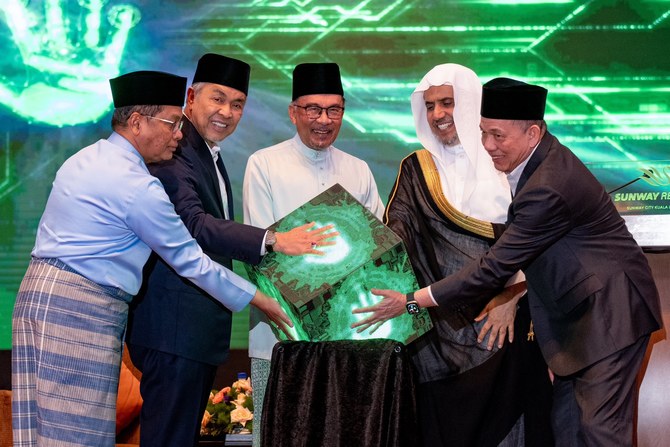
- MWL co-organized international gathering with the Malaysian government
- Prime Minister Anwar Ibrahim delivers speech during the conference
KUALA LUMPUR: More than 2,000 religious leaders and scholars from 57 countries gathered in Kuala Lumpur on Tuesday for a conference organized by the Muslim World League to discuss the role of religion in facilitating dialogue and peace initiatives.
The MWL, an international non-governmental Islamic organization founded in Saudi Arabia in 1962, organized the 2024 International Conference of Religious Leaders with Malaysia’s Department of Islamic Development.
The conference was inaugurated by Malaysian Prime Minister Anwar Ibrahim and MWL Secretary-General Sheikh Dr. Mohammad bin Abdulkarim Al-Issa.
“This religious conference will be an annual feature in Malaysia since it has proved successful in building an understanding and affinity among religions in the world, as well as in Malaysia,” Anwar said during his speech.
“In a conference like this, we can observe the things that need to be done and need to be improved among Muslims, Christians, Buddhists or Hindus. We want to listen to your advice, criticisms and suggestions.”
While about two-thirds of Malaysia’s more than 33 million population are Muslims, there are also large Buddhist, Hindu, and Christian minorities in the country.
“Religious leaders should take an active, effective and courageous role in promoting peace and justice. It is the duty of religious leaders to ensure that governance is guided by strong moral and ethical values,” Anwar said.
Al-Issa said the conference seeks to have a tangible impact.
“This international conference was attended by international, religious, political, intellectual, academic and media leaders. It is considered the first nucleus of a major breakthrough through a number of initiatives and programs around the world, aiming to enhance friendship and cooperation between nations and peoples,” he said.
“Our world is most in need of true solidarity, solidarity with a tangible impact, and is most in need of awareness of the threats threatening its global peace and the harmony of its diverse national communities in their religions and races.”
US repatriates two dozen Westerners from Syria Daesh camp
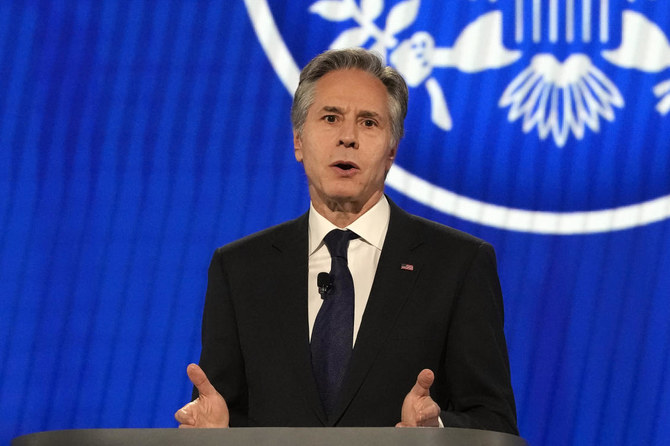
- In a complex operation involving US agencies, Kuwait and pro-US Kurdish fighters, the United States repatriated 11 US citizens
- The US also facilitated the repatriation of six Canadian citizens, four Dutch citizens, and one Finnish citizen
WASHINGTON: The United States announced Tuesday it had brought back two dozen Western citizens, half of them Americans, from a camp for Daesh prisoners in Syria, its largest-ever repatriation as thousands languish.
In a complex operation involving US agencies, Kuwait and pro-US Kurdish fighters, the United States repatriated 11 US citizens, including five minors, as well as a nine-year-old non-US sibling of an American, Secretary of State Antony Blinken said.
The United States in the same operation facilitated the repatriation of six Canadian citizens, four Dutch citizens, and one Finnish citizen, among them eight children, he said.
“This is the largest single repatriation of US citizens from northeast Syria to date,” Blinken said in a statement.
“The only durable solution to the humanitarian and security crisis in the displaced persons camps and detention facilities in northeast Syria is for countries to repatriate, rehabilitate, reintegrate and, where appropriate, ensure accountability for wrongdoing,” he said.
The United States has long pushed European governments to bring back nationals who went to fight for the Daesh group — or their children.
Most European countries have done so but slowly and despite initial reservations, especially in countries with a history of jihadist attacks at home such as France and Britain.
Blinken did not identify the people who were repatriated.
The New York Times, quoting unidentified sources, said they included an American woman, whose Turkish husband apparently took the family to Daesh territory and was later killed, and their nine children.
The Star Tribune of Minneapolis reported last week that a man who joined Daesh but then became a valuable informant was seeking the repatriation of two sons, one apparently the non-US citizen, to be raised by their grandparents in Minnesota.
The repatriations remain controversial in the United States as well, with the administration of former president Donald Trump in one prominent case insisting that a young woman seeking to return was not legitimately a US citizen.
The Kurdish-led Syrian Democratic Forces (SDF) helped US forces crush the Daesh group.
Five years after the extremists were ousted from their last territory, the SDF still holds more than 56,000 detainees with alleged or perceived links to the Daesh group.
Kurdish authorities have been asking foreign governments to repatriate their nationals but Western governments have responded slowly for fear of domestic backlash.
Putin starts new six-year term with challenge to the West
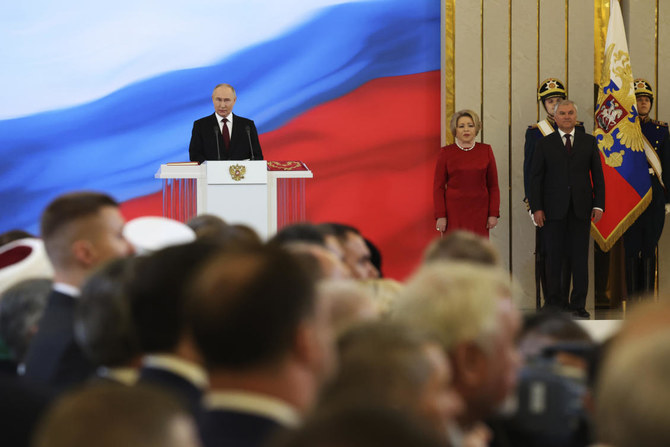
- Putin is sworn in for fifth term
- US and many EU states stay away
- Putin says he’s not ending dialogue with West
MOSCOW: Russian President Vladimir Putin said it was up the West to choose between confrontation and cooperation as he was sworn in for a new six-year term on Tuesday at a Kremlin ceremony that was boycotted by the United States and many of its allies.
More than two years into the war in Ukraine, Putin said he wanted to “bow” before Russia’s soldiers there and declared in his inauguration speech that his landslide re-election in March was proof the country was united and on the right track.
“You, citizens of Russia, have confirmed the correctness of the country’s course. This is of great importance right now, when we are faced with serious challenges,” he told dignitaries in a gilded Kremlin hall where a trumpet fanfare sounded to greet his arrival.
“I see in this a deep understanding of our common historical goals, a determination to adamantly defend our choice, our values, freedom and the national interests of Russia.”
At 71, Putin dominates the domestic political landscape. Leading opposition figures are in prison or exile, and his best known critic, Alexei Navalny, died suddenly in an Arctic penal colony in February.
Yulia Navalnaya, the late dissident’s wife, urged supporters in a video on Tuesday to keep up the struggle against Putin. “With each of his terms, everything only gets worse, and its’ frightening to imagine what else will happen while Putin remains in power,” she said.
On the international stage, Putin is locked in a confrontation with Western countries he accuses of using Ukraine as a vehicle to try to defeat and dismember Russia.
Putin told Russia’s political elite after being sworn in that he was not rejecting dialogue with the West, including on nuclear weapons.
“The choice is theirs: do they intend to continue trying to restrain the development of Russia, continue the policy of aggression, incessant pressure on our country for years, or look for a path to cooperation and peace?” he said.
With Russia’s troops advancing gradually in eastern Ukraine, the top US intelligence official said last week that Putin appeared to see domestic and international developments trending in his favor and the conflict was unlikely to end anytime soon.
It remains unclear how far Putin will seek to press the war and on what terms he might discuss ending it — decisions that will depend in part on whether Joe Biden or Donald Trump wins the US presidential election in November. Ukraine says peace can only come with a full withdrawal of Russia’s troops, who control nearly 20 percent of its territory.
Western absentees
Putin, in power as president or prime minister since 1999, will surpass Soviet leader Josef Stalin and become Russia’s longest-serving ruler since 18th century Empress Catherine the Great if he completes a new six-year term. He would then be eligible to seek re-election again.
He won victory by a record margin in a tightly controlled election from which two anti-war candidates were barred on technical grounds. The opposition called it a sham.
The United States, which said it did not consider his re-election free and fair, stayed away from Tuesday’s ceremony.
Britain, Canada and most EU nations also decided to boycott the swearing-in, but France said it would send its ambassador.
Ukraine said the event sought to create “the illusion of legality for the nearly lifelong stay in power of a person who has turned the Russian Federation into an aggressor state and the ruling regime into a dictatorship.”
Sergei Chemezov, a Putin ally, told Reuters before the ceremony, that Putin brought stability, something which even his critics should welcome.
“For Russia, this is the continuation of our path, this is stability – you can ask any citizen on the street,” he said.
Nuclear tensions
Russia’s relations with the United States and its allies are at their lowest point since the Cuban Missile Crisis of 1962, when the world came to the brink of nuclear war.
The West has provided Ukraine with artillery, tanks and long-range missiles, but NATO troops have not joined the conflict directly, something that both Putin and Biden have warned could lead to World War Three.
Underscoring the rise in nuclear tensions, Russia said on Monday it would practice the deployment of tactical nuclear weapons as part of a military exercise, after what it said were threats from France, Britain and the United States.
One of the decisions awaiting Putin in his new term will be whether to seek to renew or replace the last remaining treaty that limits Russian and US strategic nuclear warheads. The New START agreement is due to expire in 2026.
In line with the constitution, the government resigned at the start of the new presidential term. Putin ordered it to remain in office while he appoints a new one which is expected to include many of the same faces.



